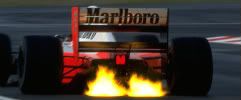I can't really comment on F1 but on road cars:
Tyre pressures affect the handling of cars quite substantially. If you are on track, you will tend to run with lower (cold) tyre pressures than on the road because you will be making the tyres work a lot more aggressively, causing the air in them to heat up more and therefore inflate more. If your tyres have too high a pressure, you may find your car gets very oversteery (as I found out once

).
Tyres tend to have optimum points where the rubber is at it's most 'sticky' therefore you want to make sure that at true race pace, your tyre temperatures are at the optimum point - and obviously you can partially control this via pressures.
Also, the contact patch between the road and the tyre will be affected by tyre pressure - this isn't as simple as it sounds as you might have a different optimum for different corners so you might trial different tyre pressures to see which gives you the quicker lap time. Tyre pressure can be adjusted to change the handling characteristics of your car. By increasing tyre pressure, the tyre profile becomes more round, which decreases the size of the contact patch. If you increase front tyre pressure, the car
tends to become tighter (added understeer), and if you increase rear tyre pressure, the car
tends to be looser (added oversteer).
I'm not an expert - the above is my understanding from talking to random people

So anyone who's more enlightened, please feel free to correct me on the above! I just know that when I used to have my Lotus, the tyre pressures were key and changing them slightly would change the overall handling characteristics of the car substantially.








 ).
). So anyone who's more enlightened, please feel free to correct me on the above! I just know that when I used to have my Lotus, the tyre pressures were key and changing them slightly would change the overall handling characteristics of the car substantially.
So anyone who's more enlightened, please feel free to correct me on the above! I just know that when I used to have my Lotus, the tyre pressures were key and changing them slightly would change the overall handling characteristics of the car substantially.
